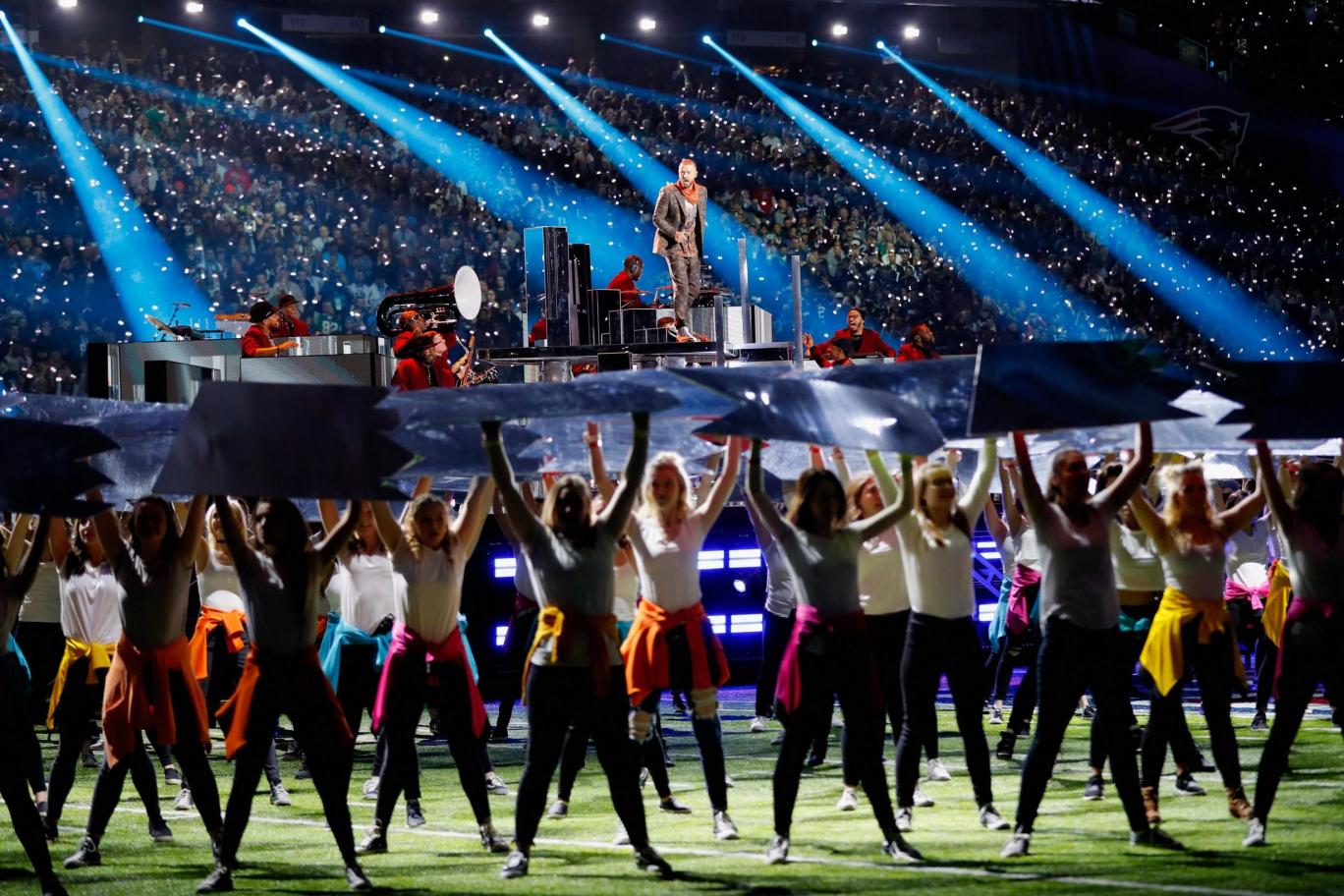The Sound of Globalism
February 5, 2018

AMERICA has a great folk music tradition (see an example below) — and thousands of musicians out there still perform it and are starved for attention. America has outstanding college choirs, high school choirs, children’s choirs which play inspiring and happy music that comes from the soul of our country. Marching bands can still get crowds going with the music of celebration for a crowd.
Then why at a major sporting event such as the Super Bowl do we get rock spectacles with megastars who already get tons of visibility?
The answer is, the rock spectacle is a form of political, economic and spiritual control, like feeding drugs to people you want to buy your products, do your bidding and sell their souls. That’s not to say that many millions of people don’t enjoy it; they clearly do, just as drug users like the substances that get them high. Rock is the music of revolution and desire. In the crowd at a mass spectacle, the nation and individual vanish in an ocean of throbbing, tribalistic percussion, light wizardry and unleashed desire.
It’s control through the unleashing of desire. Those enslaved to passion cannot easily act for themselves or think clearly. E. Michael Jones, in his book Dionysos Rising: The Birth of the Cultural Revolution Out of the Spirit of Music, wrote:
Inordinate desires are constantly interfering with the harmonious ordering of parts essential to music. When reason does not recognize and respect degree, there is no harmony in nature. Reason is replaced by will as the guide to human action, and chaos on the personal, political, and cosmic levels follows as a result. Inordinate desires held and nurtured by the individual will spread to the body politic and bring ruin. In each instance, the times “will be out of tune.”
Order lacking in one area will make itself felt in another. Because political harmony will begin in the well-ordered soul and radiate out to encompass the body politic, music has an especially important part to play in society. Music acts directly on the soul. Disordered music leads to disordered lives, which lead to disorder in the state. Plato, sensing the importance of order in the soul, banned the playing of certain modes in his ideal republic in the certainty that the disorder this music into the soul would soon put the state in jeopardy of insurrection.
In America, rock spectacles are not so much about insurrection by the people as insurrection against the people.
“The rock revolution,” wrote Fr. Jean-Paul Régimbal, “makes young people lose their sense of belonging to this group or that country. Instead, they have the feeling of being citizens of a world without faith, law or obligations to others …”
Rock always seems new, but it’s actually as old as the Fall of Man.
— Comments —
Alan writes:
Apropos the cultural significance of “rock music”:
Beginning in the mid-1960s, groups like The Beatles, The Rolling Stones, and The Doors encouraged rebellion and revolution through “rock music” that was increasingly flamboyant, raucous, and irreverent. The mere fact that “revolution” had by then become a subject of popular music reflected a sea change in American culture.
Lawrence Auster wrote that he thought the song “Revolution”, released by The Beatles in 1968, was actually “wittily anti-Revolution.” [“The Beatles, Revisited”, View from the Right, Oct. 4, 2012 ] Why would he believe it was “anti-revolution”? Because John Lennon said so? Was that a good reason? Pardon my skepticism, but I believe that Lennon and McCartney wrote and recorded “Revolution” knowing full well that its “real meaning” would be ambiguous and that their millions of young fans would interpret it as pro-revolution. I think they were in it for the money, drugs, and women and did not care a fig about how their songs were interpreted.
I cannot prove that “Revolution” was pro-Revolution any more than Mr. Auster (for whom I had great respect) could prove it was anti-Revolution. Like him, I enjoyed some of The Beatles’ records from their early years. But from 1966-’67 onward, their music changed in tone and spirit from simple, cheerful melodies to pretentious songs whose precise meaning could not be pinned down. It was as if the life-affirming songs of their early years had served to set the stage for the pretentious overproductions tinged with symbolic meanings in their later years. I suggest therefore that we evaluate a song like “Revolution” in the larger context of the net effect The Beatles had on Western culture. Was it for better or worse? I remain skeptical towards anyone who attributes peaches-and-cream innocence to the lyrics in a song like “Revolution.” I suggest a more credible estimate of that song’s meaning was offered by Gary Allen in 1969 when he wrote:
“[In “Revolution”, ] The Beatles are simply telling the Maoists that Fabian gradualism is working and that the Maoists might blow it all by getting the public excited before things are ready for “Revolution”. The song makes it perfectly clear that The Beatles are on the side of, and working for, “Revolution” and that their war is going to be successful (it’s gonna be alright). In short, “Revolution” takes the Moscow line against Trotskyites and the Progressive Labor Party, based on Lenin’s Leftwing Extremism: An Infantile Disorder.”
[Gary Allen, “That Music: There’s More to it Than Meets the Ear,” American Opinion, Feb. 1969, pp. 49-62; p. 60 ]
